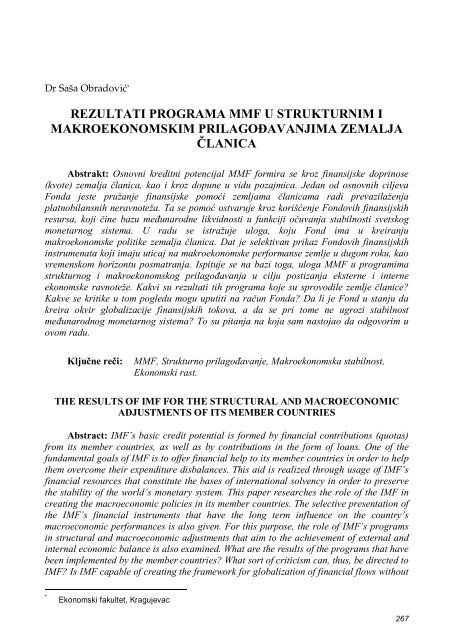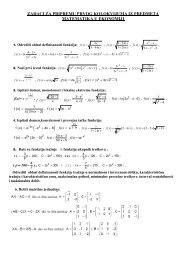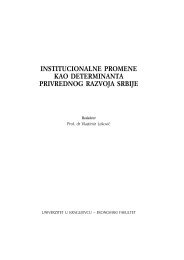- Page 1:
UNIVERZITET U KRAGUJEVCU EKONOMSKI
- Page 4 and 5:
iv Prof. dr Emilija Vuksanović, mr
- Page 6 and 7:
vi Doc. dr Vesna Stojanović-Aleksi
- Page 8 and 9:
viii Emilija Vuksanović, Ph.D., Vi
- Page 10 and 11:
x Edin Ramić, M.Sc. FOREIGN DIRECT
- Page 13 and 14:
Prof. Alessio Lokar ∗ Prof. Lubic
- Page 15 and 16:
Table 1: FDI Flows to Emerging Mark
- Page 17 and 18:
C. FDI in Central and Eastern Europ
- Page 19 and 20:
D. Comparison between Russia, Polan
- Page 21 and 22:
emain two possible strategies: fore
- Page 23 and 24:
If we take into account the UNCTAD
- Page 25 and 26:
Economic Variables Unemployment Rat
- Page 27 and 28:
2007 and 2008, is about a certain r
- Page 29 and 30:
application of fiscal measures, lik
- Page 31 and 32:
If in Slovenia, Poland and Russia t
- Page 33 and 34:
Prof. Patrizia Tiberi Vipraio ∗ H
- Page 35 and 36:
desirable, to accelerate the recove
- Page 37 and 38:
To sum up the present discussion, a
- Page 39 and 40:
decoding of spilled knowledge etc.
- Page 41 and 42:
4. Is there a scope for Development
- Page 43 and 44:
‘right’ combination of ‘marke
- Page 45 and 46:
Prof. Pece Nedanovski, Ph.D. * Kate
- Page 47 and 48:
institutionalists aim at having a w
- Page 49 and 50:
esponsible for maintaining the macr
- Page 51 and 52:
contact and they have mutual coordi
- Page 53 and 54:
Institutions responsible for creati
- Page 55 and 56:
procedures and 408.8 days, whereas
- Page 57 and 58:
• Supporting the stability and co
- Page 59 and 60:
References 1. Nicola Acocella, Econ
- Page 61 and 62:
Bigger inflow of FDI as well as str
- Page 63 and 64:
Takođe se može primetiti rastući
- Page 65 and 66:
narednim godinama znatnije povećao
- Page 67 and 68:
pojačaju izvozne potencijale doma
- Page 69 and 70:
tabelu 3.). Uprkos tome, očigledno
- Page 71 and 72:
Help?, IMF Working Paper wp/05/110,
- Page 73 and 74:
attract FDI, but policies have been
- Page 75 and 76:
However, larger share of the foreig
- Page 77 and 78:
financial intermediation or tourism
- Page 79 and 80:
Chart 2: FDI and merchandise export
- Page 81 and 82:
The Western Balkan still lack expor
- Page 83 and 84:
Appendix: Current account and Trade
- Page 85:
Kreiranje institucionalnog okvira z
- Page 88 and 89:
78 1. Uvod Sposobnost nacionalne pr
- Page 90 and 91:
je cilj kreiranje povoljnih uslova
- Page 92 and 93:
spillovere znanja u lokalnoj poslov
- Page 94 and 95:
između preduzetnika koji su u proc
- Page 96 and 97:
šeme prava intelektualne svojine k
- Page 98 and 99:
Šta više, ovo bi moglo da bude je
- Page 100 and 101:
90 Tabela 2. Ocena tražnje i ponud
- Page 102 and 103:
mogućnosti za razvoj ljudskog kapi
- Page 104 and 105:
ANEX: Tabela 1. Stubovi konkurentno
- Page 106 and 107:
etter organization and management a
- Page 108 and 109:
(preko 1.300 milijardi dolara). Uku
- Page 110 and 111:
100 Evropa Belgium France Germany V
- Page 112 and 113:
godina. Tu ogromnu količinu uvezen
- Page 114 and 115:
niži u odnosu na Češku (3,2 puta
- Page 116 and 117:
U cilju stvaranja što povoljnijeg
- Page 118 and 119:
klime za dinamičniji rast priliva
- Page 120 and 121:
110 "Transparentno finansijsko izve
- Page 122 and 123:
112 Emitenti Finansijsko izveštava
- Page 124 and 125:
114 Tabela 2 - Međuizveštaji mena
- Page 126 and 127:
116 Polugodišnji finansijski izve
- Page 128 and 129:
118 Godišnji finansijski izveštaj
- Page 130 and 131:
Prof. dr Emilija Vuksanović* Mr Vi
- Page 132 and 133:
122 Koncept regulisanja bankarskog
- Page 134 and 135:
institucija i zaštiti potrošače.
- Page 136 and 137:
njegovih sastavnih delova, određiv
- Page 138 and 139:
obelodanjivanja. 39 Ipak se očekuj
- Page 140 and 141:
Posle 2000. godine usledile su dram
- Page 142 and 143:
finansiranja terorizma, kao i sa dr
- Page 144 and 145:
134 8. Ioannou, S., (2006), Complia
- Page 146 and 147:
136 Key words: corporate globalizat
- Page 148 and 149:
postale kompleksne i raznovrsne mul
- Page 150 and 151:
korporativne kulture koja kao rezul
- Page 152 and 153:
Kako međunarodni etički kodovi i
- Page 154 and 155:
Kompanije u Srbiji, koje su obuhva
- Page 156 and 157:
lojalnost klijenata, očuvanje živ
- Page 158 and 159:
(vremena, motivacije, znanja, prili
- Page 160 and 161:
Doc. dr Tadija Đukić * 150 FINANS
- Page 162 and 163:
četiri posmatrane zemlje ne predst
- Page 164 and 165:
utvrđivanja granica njihovih razli
- Page 166 and 167:
Zato su sva evropska preduzeća či
- Page 168 and 169:
Belgija, Luksemburg i Nemačka odlo
- Page 170 and 171:
160 Finansijsko izveštavanje u Rep
- Page 172 and 173:
ačunovodstvene regulative, određe
- Page 174 and 175:
MSFI. Mala preduzeća i preduzetnic
- Page 176 and 177:
166 8. Koletnik F., et al, Osnivanj
- Page 178 and 179:
egional (or international) arrangem
- Page 180 and 181:
projekt, izvršilo realokaciju proj
- Page 182 and 183:
merdžeri i akvizije) nego na njiho
- Page 184 and 185:
potencijalne deformacije. Značajno
- Page 186 and 187:
usluge). Međutim, bez obzira na ov
- Page 188 and 189:
Japan i SAD primenjuju slične pore
- Page 190 and 191:
privlačenje stranih direktnih inve
- Page 192 and 193:
subvencije. U stvari, multinacional
- Page 194 and 195:
Mr Marija Džunić * 184 POVERENJE
- Page 196 and 197:
kompleksna priroda odnosa između r
- Page 198 and 199:
tj. da nije u pitanju nasleđe, koj
- Page 200 and 201:
Kao što se iz navedenog vidi, pove
- Page 202 and 203:
za lokalnu ekonomiju i mala porodi
- Page 204 and 205:
1993]. Prema drugim shvatanjima, po
- Page 206 and 207:
196 10. Knack, S., Keefer, P. (1997
- Page 208 and 209:
198
- Page 210 and 211:
200 Interes međunarodnih instituci
- Page 212 and 213:
- investicije u kupovinu kompletnih
- Page 214 and 215:
asoloživim podacima u 2004-2005.go
- Page 216 and 217:
analiza razvoja i potrebe kreiranja
- Page 218 and 219:
208 Analize doprinosa SDI razvoju z
- Page 220 and 221:
210 13. J. Jasnson and J. Stokman -
- Page 222 and 223:
212 Key words: globalization, count
- Page 224 and 225:
ekonomsko-političkom okruženju ko
- Page 226 and 227: 216 3.1. Istorijska metoda Istorijs
- Page 228 and 229: Odnos volatilnosti može se izraču
- Page 230 and 231: Usvojene procedure i politike moraj
- Page 232 and 233: Slobodan Cvetanović, Igor Mladenov
- Page 234 and 235: Na osnovu podataka iz tabele 1 vidi
- Page 236 and 237: transferi (donacije) i krediti od m
- Page 238 and 239: 228 Literatura: 1. Cvetanović, S.,
- Page 240 and 241: 230 Umesto uvoda: ko su pasivni uč
- Page 242 and 243: uplitanje šireg, međunarodnog okr
- Page 244 and 245: Uopšteno govoreći, predvidljivo o
- Page 246 and 247: ovakav tip investicija doprinosi ef
- Page 248 and 249: nivou razvoja (u zavisnosti od toga
- Page 250 and 251: Specifičnost Zapadnog Balkana je u
- Page 252 and 253: 242 11. Demekas, D., Horvath, B., R
- Page 254 and 255: Doc. dr Aleksandra Patoska, pom.ass
- Page 256 and 257: ideološke predrasude, i kad je plu
- Page 258 and 259: 248 Slika 1 : Priliv IDI-ja, u grup
- Page 260 and 261: 250 Slika 3: Jugo- istočna Evropa
- Page 262 and 263: Efekti su dugoročni, IDI-je u neki
- Page 264 and 265: dr Petar Veselinović mr Danijela D
- Page 266 and 267: tehnologijama i tržištima. Uvode
- Page 268 and 269: međuproizvodima i nekim investicio
- Page 270 and 271: okolnostima dovelo je i do drastič
- Page 272 and 273: 262 Tabela 5: Najvažnije SDI u Srb
- Page 274 and 275: trenutka izdvajanja iz EPS-a korist
- Page 278 and 279: endangering international monetary
- Page 280 and 281: pristupni limit u okviru trogodišn
- Page 282 and 283: Izvršavanje mera u programima koje
- Page 284 and 285: U studiji 45 MMF zajmodavnih aranž
- Page 286 and 287: kondicionalnosti MMF ukazuje na ned
- Page 288 and 289: 278 Literatura 1. Camdessus, M. (19
- Page 290 and 291: 280 Uvod Uslovljenost rizika i prin
- Page 292 and 293: izika očekivanog prinosa, koja zav
- Page 294 and 295: dovoljno finansijskih instrumenata
- Page 296 and 297: 286 rp = θ 1ri + θ 2 gde su: r f
- Page 298 and 299: 288 r m - očekivaii prinos od trž
- Page 300 and 301: 290 σ θ ∗ p m = θ σ = σ m
- Page 302 and 303: obavljanju trgovine, brzom rastu no
- Page 304 and 305: its task is also to show their nega
- Page 306 and 307: 1. SDI bum u periodu 1979-1981. god
- Page 308 and 309: itno uzeti u obzir veličinu trži
- Page 310 and 311: industriju, a najznačajniji invest
- Page 312 and 313: očekuje privatizacija najvrednijih
- Page 314 and 315: Zbog nestabilne političke situacij
- Page 316 and 317: 306 Literatura 1. Dunning J.H., Re-
- Page 318 and 319: u vidu da je reč o logici dijaloga
- Page 320 and 321: - Nizak BDP po stanovniku; - Visok
- Page 322 and 323: U toku 2005. godine je doneta Uredb
- Page 324 and 325: sredstava. Neophodno je obezbediti
- Page 326 and 327:
dr Boris Siljković * Prof. dr Kost
- Page 328 and 329:
318 Tabela 1. Tržišna pozicija os
- Page 330 and 331:
U razvijenim finansijskim sistemima
- Page 332 and 333:
Dakle, Novi Zakon o vlasničkom pre
- Page 334 and 335:
osiguranje, 2. Croatia osiguranje,
- Page 336 and 337:
delu tržišta više nego skromnih
- Page 338 and 339:
328 mr Nenad Stanišić * PRILIV ST
- Page 340 and 341:
330 Promene obima i geografske usme
- Page 342 and 343:
Uvoz 1990. 1991. 1992. 1993. 1994.
- Page 344 and 345:
Istovremeno, došlo je i do geograf
- Page 346 and 347:
ALBANIJA BiH BUGARSKA ČEŠKA HRVAT
- Page 348 and 349:
Tabela br.6: Udeo intragranske trgo
- Page 350 and 351:
340 Komparacija spoljnotrgovinskih
- Page 352 and 353:
342 Tabela br. 8: Neto priliv stran
- Page 354 and 355:
dostiže 6,4 milijardi dolara, što
- Page 356 and 357:
troškova proizvodnje u svrhu izvoz
- Page 358 and 359:
investiranje konkretnih infrastrukt
- Page 360 and 361:
Devedesete godine XX veka bile su g
- Page 362 and 363:
miliona USD na 8,8 milijardi USD).
- Page 364 and 365:
stranih direktnih investicija, Buga
- Page 366 and 367:
U pogledu geografske distribucije p
- Page 368 and 369:
358 Literatura 1. Kovačević, Mla
- Page 370 and 371:
360 Uvod Globalizacija je proces ko
- Page 372 and 373:
Ovakvo stanje se opravdava još uve
- Page 374 and 375:
- rezervisanjem dela akumuliranog d
- Page 376 and 377:
Ključni faktor korektnosti i realn
- Page 378 and 379:
poslovnog dobitka i konstantne pros
- Page 380 and 381:
370 Zaključak Globalizacija je, sa
- Page 382 and 383:
372 - market globalisation - produc
- Page 384 and 385:
mape u momentu otkrića Amerike bil
- Page 386 and 387:
376 Grafik 1. Stopa rasta svetske p
- Page 388 and 389:
378 3.2. Međunarodni monetarni fon
- Page 390 and 391:
- Ekstrovertno orijentisani i na tr
- Page 392 and 393:
Mr sc. Edin Ramić 127 382 STRANE D
- Page 394 and 395:
384 Institucije za podršku i promo
- Page 396 and 397:
386 Tabela 1: Strane direktne inves
- Page 398 and 399:
388 Priliv stranih direktnih invest
- Page 400 and 401:
390
- Page 402 and 403:
392
- Page 404 and 405:
Circumstances for long-term coopera
- Page 406 and 407:
određena strategijska korist za pa
- Page 408 and 409:
kada jedan ili više partnera, ose
- Page 410 and 411:
400 Koncept Porterovog lanca dodate
- Page 412 and 413:
Dr Vesna Stojanović Aleksić * 402
- Page 414 and 415:
• Pristup pravednosti i jednakost
- Page 416 and 417:
Na drugom, konvencionalnom nivou, l
- Page 418 and 419:
Usklađivanje dominantnog sistema v
- Page 420 and 421:
primerima, ali i ugledajući se jed
- Page 422 and 423:
eggining of this new millenium may
- Page 424 and 425:
Izvođenje definicije transnacional
- Page 426 and 427:
Transnacionalne korporacije se najv
- Page 428 and 429:
mr Sreto Aleksić, mr Sanja Vranje
- Page 430 and 431:
Partnerski odnosi, gdje dvije ili v
- Page 432 and 433:
422 FINANSIJSKI VRIJEDNOSTI 1. konv
- Page 434 and 435:
424 Svetski prosek Bosna I Hercegov
- Page 436 and 437:
Mr Jovan Zubović, istraživač sar
- Page 438 and 439:
or plan to enter it have to identif
- Page 440 and 441:
5. FDI are extremely high, activiti
- Page 442 and 443:
elatively stable currency so creati
- Page 444 and 445:
wanting to closely and most efficie
- Page 446 and 447:
Na kraju se donosi odluka o marketi
- Page 448 and 449:
438 • Neposredna internacionaliza
- Page 450 and 451:
440 • Koncesije (kupovina na odre
- Page 452 and 453:
uslovima poslovanja. Većina zemalj
- Page 454 and 455:
444 najvišu cenu radaiskazanu u ev
- Page 456:
Svetska banka za obnovu i razvoj, d






